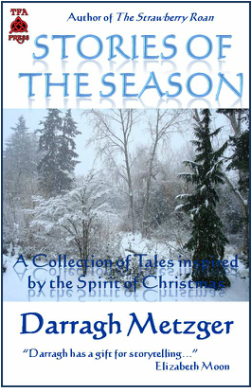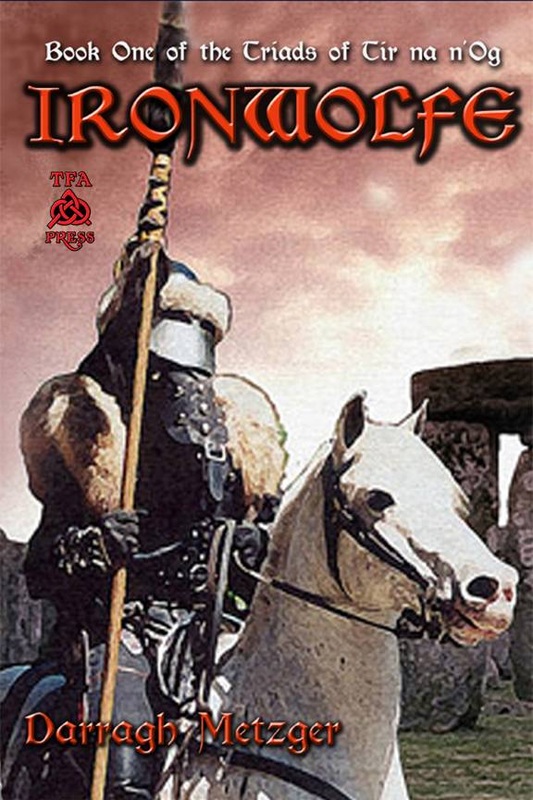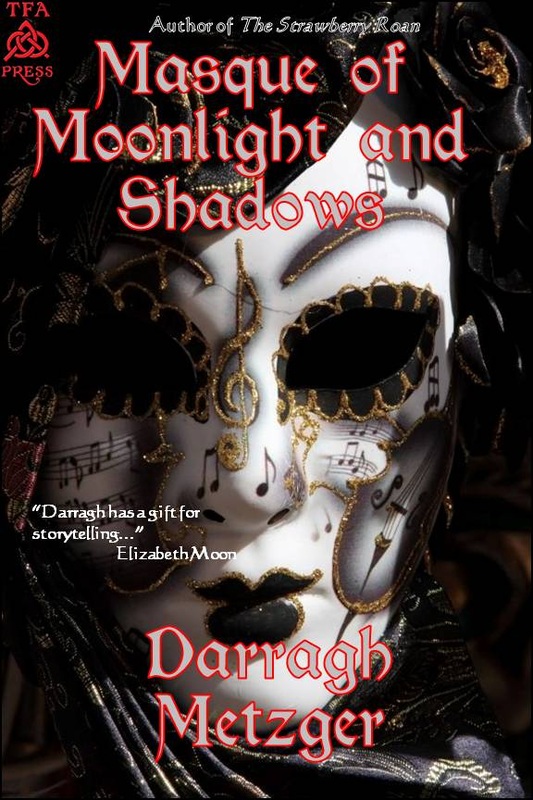One of the quiet pleasures my husband and I enjoy is "story time." We pick out a book and I read it aloud. We usually only get through a chapter or two a night, stopping before my voice gives out. Dameon is a great audience, and I get to be an actor again for a while, calling up skills I don't use much since I quit the stage.
In virtually every book I read, I find typos and other editorial errors that raise my hackles or stop me cold. "How could this happen in a professionally edited book?" I fume. Pure carelessness. Sloppy. It shouldn't be tolerated. Humph, and all that.
Then a few months ago, Dameon's book of choice was The Triads, the original first book of my Triads of Tir na n'Og series (it's now the second, since I wrote Ironwolfe, but it was #1 for its original release). Once we finished that, we just kept going and read through The Red Triad, The Green Triad, The Blue Triad, The Ironlords, and The Gate, one after another. It's been long enough that I'd actually forgotten some of the earlier books, and the details on the later ones were getting comfortably blurry.
Overall, I'm still proud of them. They're darned good reads, even with some of the shortcuts I ended up taking and finding things I'd change now if I could. But one thing I really didn't enjoy at all.
I am a really good editor. Ask anyone I've done it for. But you'd never know it by reading some of my own work. As Robin used to say, "Holy Scrabble, Batman!" How the blue-bloody-hell did that many typos get by me?
It is not the fault of my Alpha readers. The mistakes all happened on parts I re-wrote or changed later. I've heard other writers admit they can't find the mistakes in their own work. And I know it's often true of me, as well; I read what is in my head instead of what is on the page. I see what I expect to see, not necessarily what is actually there, staring me in the face in black and white. I was sure that this time, however, I'd gone through every sentence with a fine-toothed comb, over and over again. I was convinced that I, with my so-superior editing ability, had caught what was there to catch.
Most of the errors, however, happened in the later books. The ones written after I no longer had my core group of Beta readers, and decided against finding replacements in the interest of saving time. I have most definitely been humbled.
One of the joys of being an indie publisher is that when I find a problem, I can fix it. But that there were that many problems definitely makes it a mixed blessing. I will be re-loading the new, cleaner versions as soon as possible, and arguing the nice people at KDP into re-loading the new text into my e-books. I understand there is a way to let my e-readers get the new, improved text free of charge. I'll be looking into that. It doesn't help all the folks who bought the trade paper versions, though.
So, the lesson I've learned: Beta readers are not a luxury, but an essential part of the writing and publishing process, especially for indie authors. Alpha readers are there to help with story issues, the "big picture" items. Your Beta readers are there to make sure your work is ready to hit the ground running. That what you put out there is not only the best story it can be, but as clean and polished as anything that comes out of a corporate press.
In virtually every book I read, I find typos and other editorial errors that raise my hackles or stop me cold. "How could this happen in a professionally edited book?" I fume. Pure carelessness. Sloppy. It shouldn't be tolerated. Humph, and all that.
Then a few months ago, Dameon's book of choice was The Triads, the original first book of my Triads of Tir na n'Og series (it's now the second, since I wrote Ironwolfe, but it was #1 for its original release). Once we finished that, we just kept going and read through The Red Triad, The Green Triad, The Blue Triad, The Ironlords, and The Gate, one after another. It's been long enough that I'd actually forgotten some of the earlier books, and the details on the later ones were getting comfortably blurry.
Overall, I'm still proud of them. They're darned good reads, even with some of the shortcuts I ended up taking and finding things I'd change now if I could. But one thing I really didn't enjoy at all.
I am a really good editor. Ask anyone I've done it for. But you'd never know it by reading some of my own work. As Robin used to say, "Holy Scrabble, Batman!" How the blue-bloody-hell did that many typos get by me?
It is not the fault of my Alpha readers. The mistakes all happened on parts I re-wrote or changed later. I've heard other writers admit they can't find the mistakes in their own work. And I know it's often true of me, as well; I read what is in my head instead of what is on the page. I see what I expect to see, not necessarily what is actually there, staring me in the face in black and white. I was sure that this time, however, I'd gone through every sentence with a fine-toothed comb, over and over again. I was convinced that I, with my so-superior editing ability, had caught what was there to catch.
Most of the errors, however, happened in the later books. The ones written after I no longer had my core group of Beta readers, and decided against finding replacements in the interest of saving time. I have most definitely been humbled.
One of the joys of being an indie publisher is that when I find a problem, I can fix it. But that there were that many problems definitely makes it a mixed blessing. I will be re-loading the new, cleaner versions as soon as possible, and arguing the nice people at KDP into re-loading the new text into my e-books. I understand there is a way to let my e-readers get the new, improved text free of charge. I'll be looking into that. It doesn't help all the folks who bought the trade paper versions, though.
So, the lesson I've learned: Beta readers are not a luxury, but an essential part of the writing and publishing process, especially for indie authors. Alpha readers are there to help with story issues, the "big picture" items. Your Beta readers are there to make sure your work is ready to hit the ground running. That what you put out there is not only the best story it can be, but as clean and polished as anything that comes out of a corporate press.
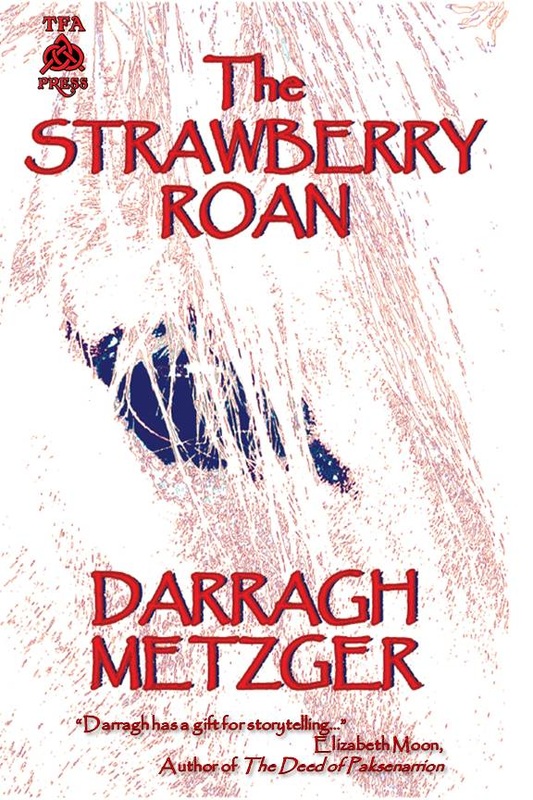
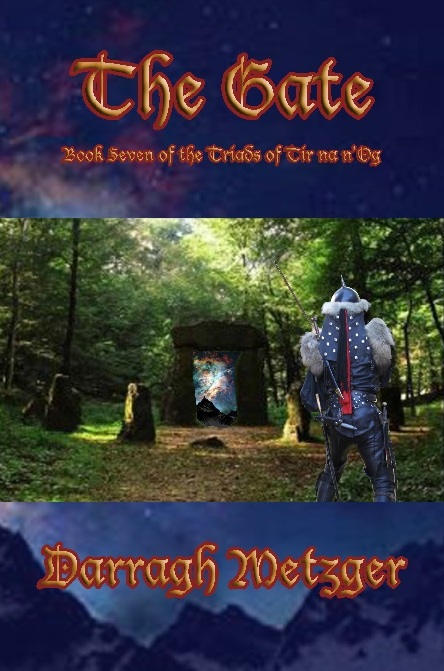
 RSS Feed
RSS Feed
